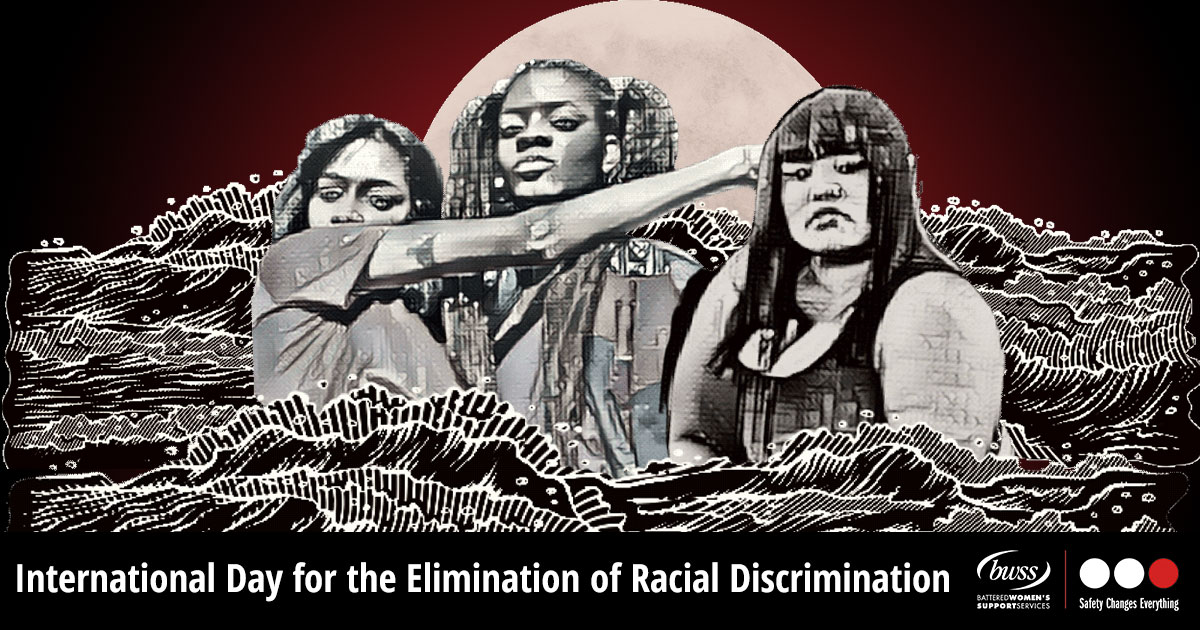
Examining the intersections of race and gender:
International Day for the Elimination of Racial Discrimination
March 21, the International Day for the Elimination of Racial Discrimination, marks the anniversary of the 1960 Sharpeville Massacre in South Africa when police opened fire on hundreds of South Africans protesting Apartheid’s passbook laws, killing 67 and wounding 186.
Though largely unknown, it is important to remember that the apartheid laws introduced by South African governments were adapted from Canadian colonial policies, including the reserve system, pass system, and Indian Act.
Mi’kmaw scholar and lawyer Pam Palmater writes,
“The oft-repeated mantra of ‘we are not a racist country’ provides comfort to many Canadians that racism and white supremacy are uniquely American problems. Nothing could be further from the truth.”
Canada’s very inception and living history is one marked by settler-colonial genocide targeting Indigenous women and two-spirit people, the enslavement of Black people, and mass migrant exclusion since the Chinese Exclusion Act and Komagata Maru.
Every day during the pandemic, we have been witnessed to escalating racism against Indigenous, Black, Asian, Muslim, and other racialized communities, especially racialized women and gender-diverse people.
Our work to eliminate gender-based violence and promote gender equity
We, at Battered Women’s Support Services, provide education, advocacy, and support services to assist survivors of violence. For over forty years, we have been working towards ending violence against women, girls, femmes, LGBTQ2S, and non-binary survivors of violence. We work from a decolonial, intersectional, feminist perspective to eliminate gender-based violence and promote gender equity. The founding women at BWSS recognized that gender-based violence does not only take place between two individuals in isolation but, rather, in a social context and a world view that systemically reinforces the power of some people to oppress others.
Responding to gender-based violence through working to end racism is challenging, but necessary.
Multiple forms of oppression are simultaneous and cannot be separated from one another; ending gender-based violence requires dismantling racism and all structural oppression.
Colour of Violence report
Next month, BWSS will be launching our first report as part of our multi-year Colour of Violence project examining the intersections of race and gender for Indigenous, Black, newcomer immigrant/refugee, and racialized women and gender diverse people experiencing gender-based violence in British Columbia Violence.
Drawing on the foundational work of INCITE! Women of Color Against Violence, our Colour of Violence project explores the extent to which gender and race influence system-based responses to gender-based violence, specifically examining the adequacy and accessibility of anti-violence services, elements of the police and criminal legal responses, as well as the intersecting involvement for survivors of colour with child welfare, immigration, mental health, income, housing, and other systems.
We wish to make visible the experiences of Indigenous, Black, newcomer immigrant/refugee, and racialized survivors so that anti-violence service provision, advocacy, and government policy center these unique realities.
Canada is a country that has extreme difficulty recognizing how deep and profound racism is, and how racism is instrumental in compounding the impact of gendered violence for survivors who are Indigenous, Black, newcomer immigrant/refugee, and racialized.
Indigenous, Black, newcomer immigrant/refugee, and racialized survivors face numerous barriers to accessing justice when they experience gender-based violence, such as lack of access to culturally safe services; mistrust of the legal system and other state systems; and being minimized or disbelieved. Indigenous, Black, and newcomer immigrant/refugee survivors face heightened barriers to justice as survivors of gender-based violence, including often being criminalized for reporting violence, having their children apprehended, or facing deportation. This is further magnified for those who are low-income, single parents, and/or working in criminalized or under-the-table economies such as sex work or garment factories.
These overlapping realities influence how Indigenous, Black, newcomer immigrant/refugee, and racialized survivors are impacted by Canadian legal systems and experience barriers to anti-violence services.
Our first report, Colour of Violence: Race, Gender & Anti-Violence Services, focuses on how gender and race influence the accessibility and adequacy of anti-violence services in British Columbia for Indigenous, Black, newcomer immigrant/refugee, and racialized women and gender-diverse survivors.
We aim to better understand and raise awareness on the experiences of Indigenous, Black, newcomer immigrant/refugee, and racialized survivors accessing formal, institutional responses to gender-based violence. Based in anti-oppressive, anti-racist, decolonial, and feminist principles, this report positions Indigenous, Black, newcomer immigrant/refugee, and racialized survivors accessing safety and justice at the very center of our anti-violence work. The goal of this report is to both shift our collective analysis of gender-based violence, as well as offer concrete anti-racist and intersectional best practices in developing anti-violence interventions. As we heard from one participant, “Understand that racism exists and survivors experience it.”
We are thrilled to release and share our Colour of Violence: Race, Gender & Anti-Violence Services report with you next month. In our work at BWSS, we know that safety changes everything. Our upcoming report is motivated by the urgency of our moment and the absolute necessity of placing Indigenous, Black, newcomer immigrant/refugee, and racialized survivors at the center of our anti-violence work.
To sign up to receive a copy of our report when it releases in April 2022, please email us at endingviolence@bwss.org




